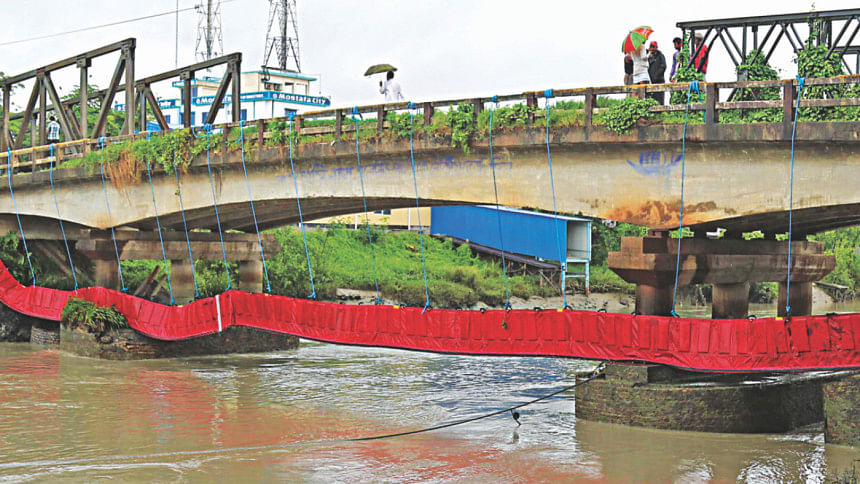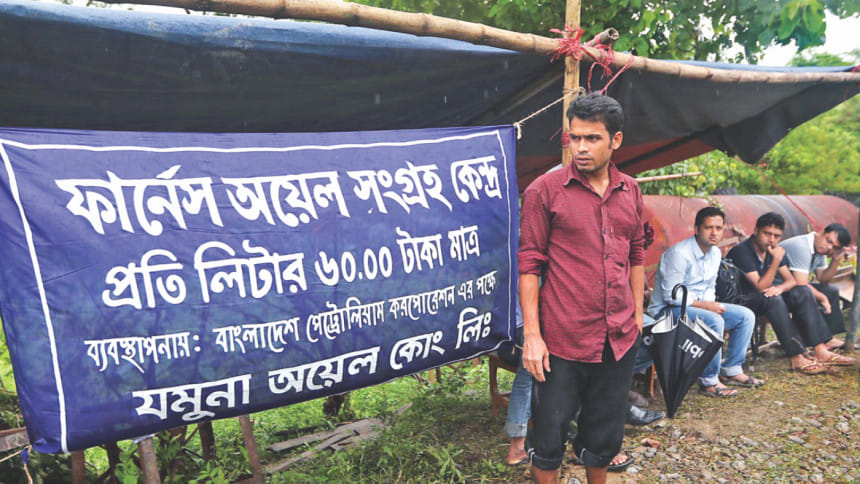Oil cleanup efforts on

Three days into the oil spill from sunken train wagons in a Boalkhali canal, the local authorities yesterday put an oil-boom in the water body to collect oil slick.
The oil-boom (floating barrier) was being handled manually due to heavy currents in the canal, locals said.
Meanwhile, the oil slick has spread about five to six kilometres inside the Halda river, about 10-km upstream from the accident spot.
A furnace oil-carrying train derailed and three of its wagons plunged into the canal on Friday.
Staff of Chittagong Port Authority (CPA) put the barrier in place after hours of hectic pursuit.
During low tides, the height of the barrier was being maintained with rope swings tied to a bridge in the military pole area.
Captain Nazmul Alam, chief conservator of CPA, said a floating barrier is used in water bodies where the flow is low.
“As the canal has a high flow of water, our men are maintaining its height manually and trying to stop oil from spreading,” he added.
Four vessels equipped with oil extraction equipments explored the Karnaphuli in last two days, but didn't find any oil slick, said Nazmul.
Fisherman Mansur, who depends on the Halda for his livelihood, yesterday said he found oil layers on riverside plants.
“Locals noticed a layer of oil in the Halda at Modunaghat area, some six km off the Karnaphuli, and informed me,” said Manzoorul Kibria, associate professor of zoology at Chittagong University.
The Halda is a major breeding ground for sweet water carps in the country, he said, adding that the oil slick might damage its biodiversity and cause irreparable damage to various fish species.
Visiting the military pole area yesterday afternoon, this correspondent saw that locals were collecting oil-tainted water hyacinths from the canal and gathering them on the banks.

Though the Bangladesh Petroleum Corporation on Sunday declared that it would buy spill oil at Tk 60 a litre, a very few people responded to the call.
Saiful, a villager from Khitabchar, said the authorities put the floating barrier in the canal three days after the accident. “So nobody could collect oil from the canal.”
Some staff of Jumuna Oil Company were seen waiting at a spot in the village to purchase oil from locals. But nobody came there till 1:30pm.
Nur Mohamamd, chairman of Sarwatali Union Parishad, said he collected 100 litres of furnace oil from the canal with the help of locals and sold it to the oil company on Saturday.
“The oil has spread to the Karnaphuli due to low and high tides in the canal,” he added.
Bangladesh Railway officials were busy in repairing the collapsed bridge yesterday. They said they would salvage the wagons after repairing the bridge by today.

 For all latest news, follow The Daily Star's Google News channel.
For all latest news, follow The Daily Star's Google News channel. 



Comments